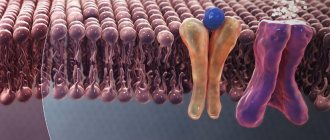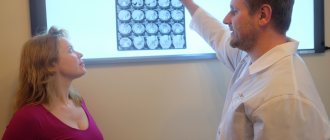Issues discussed in the material:
- Why does senile dementia develop?
- What are the symptoms, forms and stages of dementia
- How to diagnose senile dementia
- How to cure dementia
- How loved ones can help someone with senile dementia
Not all elderly people can clearly express their thoughts, reason logically, or maintain their sanity. Only a third of pensioners over 80 years of age have a clear mind, 70% have impaired thought processes and memory loss. Such disorders are simply called senile dementia, and in medicine - senile or senile dementia. What therapy is prescribed for the treatment of senile dementia, as well as the reasons for its occurrence, will be discussed in detail in this article.
Types of senile dementia
For each type of senile dementia, there are different signs of its manifestation:
Vascular dementia.
Initially, a decrease in attention and concentration appears. Then the patient quickly gets tired and gets irritated. He may be bothered by pain in the head and neck area. Insomnia or, conversely, excessive sleepiness appears. A person can sleep either 4–5 hours or the whole day.
Memory impairments are still not clearly expressed. But you should pay attention to the manifestation of emotions. Sick older people are subject to rapid changes in mood. They are indifferent to surrounding events and suffer from hallucinations. Epilepsy attacks may occur. The mobility of the limbs and gesturing decreases. Facial expressions become less pronounced. Dysuric disorders occur. Such people are unkempt and indifferent to daily self-care.
Atrophic senile dementia.
The main signal of this stage is a process that is accompanied by the inability to save, accumulate and use the information received. Simply put, memory impairment. In mild cases, this results in forgetting the events that just happened. The severe form is characterized by the inability to remember the events of several past years and loss of space. The vocabulary becomes impoverished and attention wanders. But with this form of senile dementia, glimpses of consciousness are possible, when the patient understands the severity of his illness and can somehow mask his illness.
Doctors divide forms of atrophic dementia according to the following criteria:
- Partial dementia. Expressed in memory deterioration, loss of strength, lethargy. Often the patient is depressed.
- Epileptic dementia. Clear signs appear over time. A sick person is characterized by attacks of aggression, anger, and rancor. They can perform actions carefully, consistently, often with diligent repetition. Speech inhibition is observed, interest in what is happening around disappears.
- Schizophrenic dementia. This condition requires constant supervision of the patient, preferably in a specialized institution. This form is characterized by deep withdrawal into oneself, loss of emotionality and activity.
- Alzheimer's disease. It is worth taking into account that this disease can be inherited. The onset of painful processes is possible before the age of 60, but often the likelihood increases sharply by the age of 65–75.
Initially there is memory deterioration. Distracted attention, forgetting any things or events do not bother a person at first. An alarming signal is when the patient systematically cannot remember episodes that occurred recently. However, older people remember events that happened ten years or more ago very well and in detail. But over time they are also forgotten.
The patient cannot recall in memory the data that he needs at a certain moment. The information just received is also not perceived. There is disorientation in place and time. An elderly person cannot remember the date of today, where he is now and does not even recognize himself, his family, or his friends. Along with this, vision and hearing decrease, and sensitivity decreases.
Next, the person ceases to identify himself with the outside world. The knowledge and skills associated with his profession decrease and then disappear altogether. The situation gets worse when the patient cannot cope with personal needs, the vocabulary becomes poorer, and diction is impaired.
In the early stages, older people still understand that an illness is emerging and make attempts to resist it. But with the progression of senile dementia, the critical assessment of one’s own condition decreases. Interest in his hobbies and events around him disappears, the patient withdraws and withdraws into himself.
- Pick's disease. The same applies to atrophic senile dementia, only more global. Women are often susceptible to this type of dementia.
Appears as a result of destruction and death of the cerebral cortex in the frontal and sometimes temporal lobes. Disease processes affect the emotional sphere. A person's critical self-esteem disappears. He ceases to control himself and falls into opposite emotional states (apathy, euphoria). Swears with obscene words, makes scandals for no reason.
Patients with this diagnosis are characterized by lustful behavior and the inability to control feelings of lust. A person changes before our eyes and can behave antisocially. There are no speech impairments; on the contrary, it is fast and with many words, but there is a problem with the correct use of terms and expressions. Thought processes are preserved, but the patient cannot analyze or draw correct conclusions based on the information received.
The acquired skills in counting, writing, and those related to professional activities remain for a long time. Memory does not deteriorate as much as in Alzheimer's disease, that is, the patient does not fall into an unconscious state.
Mixed dementia.
This type of senile dementia occurs as a result of destructive, destructive actions associated with the use of drugs, substances that change the human psyche. This question is relevant for those people who have been taking psychotropic drugs prescribed by psychiatrists for several years. These substances must be taken in courses. Long-term use leads to acute poisoning of the body, which can develop into dementia.
In addition to the state of causeless inspiration and enthusiasm, a persistent attachment to these substances appears. Their accumulation in the body leads to serious disorders of mental processes. With addiction comes emotionally unstable states, frequent mood swings, and blues. All this is aggravated by loss of strength, weakness, lethargy and insomnia. As a result, a severe mental disorder on the verge of insanity occurs, the person ceases to perceive the reality around him.
Reality is not a stimulus to action. The use of poisonous drugs and isolation from reality accelerate the degradation of personality. But such patients have a much higher chance of recovery and adaptation to normal living conditions than patients with Alzheimer's disease and vascular dementia.
We recommend
“Causes of itching in older people and ways to combat the disease” Read more
Causes
Acquired dementia develops as a result of brain damage and disruption of its functioning. Dementia is a disease of older people in which mental functions decline. This process is irreversible. The condition is gradually worsening. By promptly identifying and eliminating the causes of the violation, you can avoid catastrophic consequences.
Provoking factors are:
- heredity
– if there were relatives in the family with Alzheimer’s disease or other types of dementia, then the risk of collapse of mental functions increases;
- vascular sclerosis leading to atrophy of areas of the brain
– this disease is more common in women due to hormonal characteristics;
- age-related changes
– in adulthood, the body is more susceptible to disease due to a natural weakening of the immune defense;
- alcohol abuse and smoking
– intoxication of the human body becomes the cause of pathological changes, expressed in the death of neurons, deterioration of the condition of blood vessels;
- long-term use of certain medications
- thrombolytics, anticoagulants, sympathomimetics;
- metabolic disorder, vitamin deficiency
— E, group B;
- stress
, low brain activity.
The trigger for the development of dementia in a person is diseases that negatively affect the condition of blood vessels or cause the death of brain cells:
- a previous stroke - if the parts of the brain responsible for cognitive functions are affected, one episode is enough;
- organic lesions of the central nervous system;
- hematological diseases (anemia, leukemia, erythremia, thrombocythemia, hemophilia);
- diabetes;
- leukoaraiosis;
- diseases of the cardiovascular system (heart attack, hypertension, venous thrombosis, rheumatic heart disease, atrial fibrillation).
Diagnosis of senile dementia
In case of memory disorders, disturbances in mental processes, changes in human behavior, frequent mood changes, before starting treatment, you should consult a general practitioner. He will analyze the patient's complaints, examine him, and assess his mental state. If necessary, he will refer you for a consultation to a specialized doctor, who will make an accurate diagnosis and prescribe treatment.
Diagnosing a decline in brain processes at the initial stage includes answering easy speed questions, solving simple arithmetic problems, and listing events that have occurred in the recent past. At this stage it is too early to prescribe any treatment.
The final conclusion about senile dementia is made based on typical symptoms that persist for 6 months or longer.
It is also necessary to find out whether any of the relatives suffered from mental disorders or senile dementia. Accurate results of disorders are obtained using MRI and ECG. Infectious causes are identified using a lumbar puncture (lumbar puncture). Such disorders cannot be detected using a general blood test.
If the patient has diseases, including chronic ones, special medical examinations are also prescribed, depending on the symptoms. Various studies are being done to rule out false dementia. After all examinations, a treatment program is developed.
The likelihood of stopping the progression of the disease increases if you notice the symptoms in time, undergo diagnosis and begin therapy.
We recommend
“Adaptation of older people: in modern society and boarding homes” Read more
Classification according to clinical picture
Types of dementia:
- partial;
- total.
Dysmnestic or partial dementia can be suspected by a progressive decline in memory and attention. A sick person with such a disorder retains the ability to make judgments; intellectual functions change little.
With total dementia, the ability to adequately assess what is happening and make consistent judgments is absent, as is a critical assessment of one’s own condition. There is a disorder of higher mental and cognitive functions.
Treatment of senile dementia
Treatment of dementia in older people is similar to treatment of dementia of other ages, but current human illnesses are taken into account: strokes, hypertension, inflammatory processes in the lungs, etc.
Treatment of senile dementia consists of prescribing appropriate medications and applying restorative measures. But all this is aimed only at stopping the further development of the disease. An effective treatment for senile dementia has not yet been found.
All medications and methods of therapy are prescribed by neurologists and psychiatrists, based on the clinical picture of the disease and the individual characteristics of the patient.
It is strictly forbidden to take any medications on your own or use unconventional methods of treatment; there may be irreversible consequences. Consultation with a competent specialist is important.
The following drugs are used to treat dementia and senile dementia:
- Memantine. Serves to block glutamate, which is a mediator in disorders of the central nervous system and damages nerve cells.
- Drugs that block the breakdown of cholinesterase, which in turn prevents the breakdown of acetylcholine, an organic compound that improves the passage of nerve impulses to the brain.
- Razadin, Exelon, Aricept, Galantamine, Rivastigmine. Treatment with these drugs is aimed at combating memory loss.
- Sedatives to relieve anxiety and emotional stress. Treatment with tranquilizers does not provoke memory impairment and decreased mental activity.
- Busperon, Zopiclone, Imovan, Ivadal are heterocyclic medications.
- Neuroleptics that prevent the occurrence of neuroses and breakdowns: Haloperidol, Propazine, Opanzaline, Droperidone, Mazeptin, Clozapine, Risperidone, Aminazine, Sonopax, Perferazine, Fluanxol, Tioproperazine, Clopixol, Chlorprothixene, Sulpiride.
- Antidepressants that slow down the reuptake of serotonin and its re-release into the blood: Anafanil, Prozac, Citalopram. Treatment using these medications reduces anxiety.
Additionally, for vascular senile dementia, drugs that lower blood pressure and cholesterol are prescribed.
Treatment of senile dementia also involves the use of essential vitamins:
- Vitamin E. For an adult, the required amount is 800 IU per day. For older people, the doctor calculates the required amount, since when taking more than 400 IU, the risk of hemorrhages in the brain increases.
- Vitamin C. For dementia, the required daily amount is 500 mg. In addition, it increases the effect of vitamin E.
- Vitamin D. Elderly people with a preliminary diagnosis of senile dementia need to consume 600 IU per day. This amount of vitamin D is present in 500 g of milk. But for most people, this dose should be increased, since the absorption of the vitamin decreases over the years. Therefore, you should drink 0.5 liters of milk per day and plus take 400 IU of vitamin D to compensate for its deficiency.
- Zinc. Supports the normal functioning of the central nervous system. Most of it is found in meat. People with zinc deficiency and diagnosed with dementia need to eat meat 3-4 times a week and take an additional 10 mg of the vitamin per day. This helps reduce and eliminate the negative manifestations of the disease.
Treatment of senile dementia is carried out both in the hospital and at home.
At an early stage of the disease, the patient is recommended to undergo home treatment, in his usual environment. In a medical institution, dementia will only progress. Those who cannot independently care for themselves in terms of personal hygiene and who need constant supervision and qualified assistance from doctors are placed in the hospital. When a patient is aggressive and can cause harm to himself and loved ones, then observation and treatment in the hospital must be in order. If relatives do not have the opportunity to look after an elderly person, then in this case there are institutions that specialize in the care and treatment of such patients. There is a homely atmosphere, caring staff and qualified medical assistance.
Success depends on correct, timely diagnosis and immediate treatment, as well as on the presence of associated diseases. Timely measures slow down the development of senile dementia, increase adaptability to living conditions and increase its duration.
Treatment becomes more difficult when dementia progresses and becomes severe. There is a complete loss of mental abilities, loss of speech skills, and huge memory lapses. A person stops recognizing loved ones. He falls into insanity. When an infectious process occurs, treatment measures do not give an effective result, as death often occurs.
We recommend
“Low blood pressure in an elderly person: treatment and prevention” Read more
Symptoms of dementia
In the first stages:
- tremor appears, motor skills are impaired;
- there is negligence when caring for oneself - a person stops brushing his teeth, bathing, and keeping his clothes clean; speech and thinking deteriorate, short-term memory is impaired;
- concentration decreases;
- there are signs of anxiety and irritability;
- the connection between movement and mental processes (psychomotor skills) is disrupted;
- communication becomes difficult - speech deteriorates, words are confused, the ability to read and express thoughts is lost.
One of the first signs of dementia in the elderly is gradually increasing forgetfulness. At first, the sick person simply forgets and has difficulty remembering some information. Over time, this develops into complete disorientation.
A common disorder is fixation-type amnesia. Recent events are lost in memory, and those that happened earlier are preserved - only over time they are forgotten. A variant of amnesia is paramnesia - a person replaces events with imaginary ones.
As the disease progresses, the condition worsens. The changes end in complete degradation with the inability to take consistent, logical actions, planning, and self-care.
Personal deformation occurs. Negative character traits become aggravated - capriciousness, aggressiveness, greed, and a tendency to collect. Gross motor skills are impaired, which initially manifests itself in a change in gait and ends in muscle atrophy and paralysis. Perception fades - tactile sensations, vision, hearing, and smell become dull.
Additional measures and patient care
All treatment for senile dementia is to prolong life and stop the development of the disease. The task of doctors is to stop progressive pathologies, reduce symptoms, and increase mental abilities. Therefore, complex treatment is carried out, which includes the following elements:
- Sociotherapy. It consists of qualified assistance, good care, activation of the patient’s mental processes and providing a comfortable environment.
- Psychotherapy. Aimed at interacting with both patients and their relatives. Includes physiotherapy, massages, classes with specialists in maintaining and correcting speech.
- Psychopharmacology - treatment with antidepressants.
- Individual therapy aimed at reducing the content of harmful substances in the body.
Close people should behave correctly with patients. Ignoring the disease can make the situation worse. Of course, it’s unpleasant to see a loved one deteriorate. But the patient’s life expectancy and its conditions depend on proper care, treatment, assistance, care, and attention.
You shouldn’t drive away thoughts of illness, you need to accept this fact. Try to understand how the elderly person feels when you help him. There is no need to mechanically carry out your duties of caring for the patient, otherwise he may become something for you that requires constant care.
Talk to an older person. Often, patients hear and even understand what is being said to them, but simply cannot take part in the conversation due to cognitive impairment. Don't swear, don't get annoyed, don't criticize.
Ask simple questions that require yes or no answers. It may be necessary to repeat them several times, changing the words so that the patient understands the meaning.
Dementia involves the patient being unable to remember events that just happened. But the memories of ten years or more ago are very vivid and distinct. Discuss these situations with the person, listen to his stories.
To develop everyday skills, come up with a system of sequential actions and follow the patient’s daily routine.
It is also worth giving an elderly person small tasks, so he will feel needed.
Provide safety around the patient. Remove objects that could cause injury and clear the room of unnecessary furniture. Make special devices in the bathtub that you can hold on to. A place to sleep and rest should be comfortable.
Do therapeutic exercises with an elderly person without heavy loads.
All of the above measures are aimed at increasing the effectiveness of dementia treatment.
Rules of communication when a relative has insanity
It is important to remember that insanity is a serious personality change. You will not be able to communicate with your parent as before. Moreover, habitual forms of communication can enhance unwanted manifestations, provoke aggression and break off emotional contact.
- Avoid derogatory language, insults and displays of anger towards the patient. He is not able to think critically and can involuntarily offend. It is important not to take it personally and realize that this is a consequence of the disease.
- Simplify your speech when addressing a relative, choose a friendly intonation, as a person with dementia ceases to understand complex phrases and focuses more on the tone and facial expressions of the speaker. Harsh notes can cause fear and crying, even a hysterical attack.
- Chat with your loved one on topics that are familiar and interesting to him, share family news and events, ask about his past. This stimulates mental functions and will help to distance misrecognition and withdrawal. Good contact with a loved one will reduce anxiety and worry.
- Be interested in his wishes. People with cognitive impairments often stop taking initiative in communication. It is difficult for them to express their request. However, they become very offended when they remain unheard, which, again, can provoke an attack of psychosis.
Prevention
Prevention of dementia helps not only to prevent the development of this pathology, but also to slow down the progression of the process that has already begun. Doctors recommend:
- be promptly examined and treated as necessary;
- avoid excess body weight;
- stop smoking and drinking alcohol;
- regularly engage in amateur sports to maintain tone (walking, swimming, yoga, etc.);
- eat properly and balanced, drink enough clean water;
- avoid stress, physical and mental fatigue;
- engage in mental work regularly.
How to register for a mental health center
If you need counseling and hospitalization, call us at 8(969)060-93-93 . Round-the-clock operation will allow you to obtain the necessary information at any time of the day and on all days, both weekdays and weekends/holidays. The registrar will help you make an appointment with a doctor and, if necessary, call a doctor at home. We also provide a transfer service (transportation of the patient), if necessary, accompanied by a medical staff member of the clinic.
Consequences
Senile dementia is a severe irreversible condition. The prognosis depends on how early the symptoms and signs of dementia in the elderly are identified and on compliance with the prescribed treatment program.
It is impossible to cure a person in this condition, but you can:
- slow down the development of negative changes;
- smooth out unpleasant symptoms;
- prolong life by improving its quality.
The patient's condition depends on:
- the presence of concomitant diseases;
- quality of care;
- psycho-emotional atmosphere.
Research Facts
One 2013 study from the Nizam Institute of Medical Sciences in India found that speaking two languages may delay the development of dementia. An analysis of medical records from 648 cases of dementia found that those who speak two languages develop dementia an average of 4.5 years later than those who speak only one language.
Recently, studies have appeared indicating a slight decrease in the percentage of people suffering from dementia in the total number of elderly people in developed countries. So, if in 2000, 11.6 percent of people over 65 in the United States had dementia, then in 2012 there were much fewer of them: 8.8 percent.
There are 16 scientific studies demonstrating the effect of phosphatidylserine on reducing symptoms of dementia or cognitive impairment[5]. In May 2003, the US Food and Drug Administration (FDA) approved a Qualified Health Claim for phosphatidylserine, allowing US manufacturers to state on their labels that “Consumption of phosphatidylserine may reduce the risk of dementia and cognitive impairment in older adults.”
However, this statement must for now be accompanied by the caveat that “very limited and preliminary scientific research suggests that phosphatidylserine may reduce the risk of cognitive dysfunction in older adults,” since the Agency considered that the scientific community is still divided on this topic, and the majority The studies were done using phosphatidylserine derived from cow brain rather than the soy phosphatidylserine that is currently used.
Severity
There are three degrees of severity of pathology:
- mild: there is a decrease in short-term memory, emotional instability, inability to remember new things; the person can take care of himself independently and understands the need for treatment;
- moderate: self-care becomes difficult; a person begins to forget about basic actions (close the door, turn off the gas), and may get lost on the way to the store; already at this stage the patient requires constant monitoring;
- severe: complete loss of the ability to self-care and critical perception of reality, the need for constant care.











